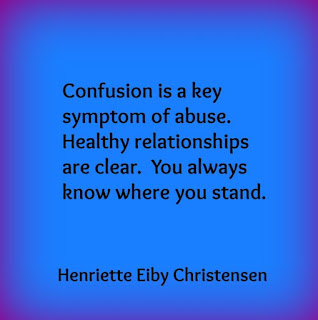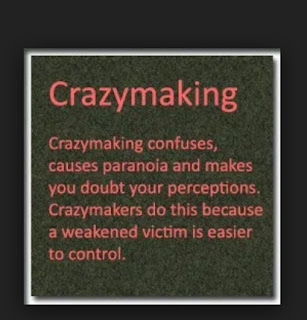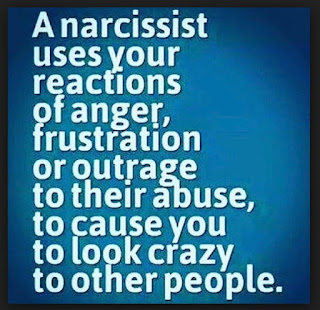12 Graphics on the Crazy Making of the Gaslighter
10 Method of Crazy Makers:
rest of article:
https://www.lifehack.org/articles/communication/ten-examples-crazy-making-relationships.html
http://www.enddomesticabuse.org/crazy_making.php
here is a Google search with other crazy making articles, lists, resources......most very good
10 Method of Crazy Makers:
rest of article:
https://www.lifehack.org/articles/communication/ten-examples-crazy-making-relationships.html
1. When your partner convinces you that something happened when it didn’t (or vice versa)
An example of this could be a social event. You might be 100% sure that you were not made aware of an upcoming party and your partner will insist they told you. A one-off occurrence can happen to anyone but when this happens several times it is a form of crazy making.
2. Passive-aggressive behaviour
If you need to be somewhere at a specific time, your partner may appear to be dawdling. They will deny this if you point it out, but subtly they are thwarting your plans. You might ask for something and they will pretend not to hear you. An item that you keep in a regular place might get moved from that spot with denials that they ever touched it. These are all examples of passive aggressive behaviour. It is manipulative and subtle. Crazy making people are too clever to be overt in their actions as they know that their behavior would never be accepted so they find clever ways to undermine you. Ways that aren’t as obvious or could be open to interpretation.
3. Everything is somehow your fault
Crazy making partners rarely admit to doing anything wrong. They manage to twist events around and somehow the blame ends up back on you. Crazy making partners seem to end up as the victim all the time. They may provoke you until you can’t take it any longer. When you eventually react negatively towards them, they will be the ‘hurt’ ones.
4. Projection
Crazy makers project their internal chaos onto others. The emotional environment around them is tense, not rational and easy-going. Instead, people in their company often feel on edge, waiting to be picked on or judged in some way. When they make you feel anger, they are giving you a taster of what they feel all the time. They may cleverly disguise it, but crazy makers often have a history of tumultuous relationships. Generally, the more passive their partner is the longer the relationship will last.
5. Non-verbal body language sends a dismissive message
Crazy makers will often make you feel as if you are doing something wrong without uttering a word. Instead, they will sigh loudly, roll their eyes (and make sure you see it) or shake their heads while you do something. This sends you a clear message that they disapprove of your actions. Instead of engaging in rational verbal communication, their subtle gestures will become something you are very in tune with. This is perfect for crazy makers as they can then carry on with their disapproving signs even when in public. On an ongoing basis, this erodes self esteem and confidence making a person even easier to manipulate.
6. Making you doubt your perceptions
Crazy makers will say provocative statements and when you react, they will immediately let you know that you are being too sensitive or that you are overreacting and that you should listen more. They will tell you that you have misunderstood them. It will always be your fault, never will they apologise for saying something that upset you – it will be your fault for not understanding them correctly. They will rarely be bothered that they have said something to upset you, instead you will be blamed for your reaction. They rarely see their part in the ‘play’. You may try harder to please them because it feels like you are the cause of all the trouble when in fact, your perceptions are valid but are completely undermined in a crazy making relationship.
7. Hypocritical behaviour
You would think that a crazy maker would be perfect in every way as they seem to have so much to say about what others do wrong. Yet, often, crazy makers are the biggest hypocrites. There is one set of rules for them and another for everyone else. Don’t anyone dare tell a white lie or withhold information yet many crazy makers do this on a regular basis.
8. It’s all about control
Crazy making in relationships is all about gaining control. Crazy making behaviour often develops in childhood. When, as a child their emotional needs are not met, children learn dysfunctional ways to cope. They take these dysfunctional strategies with them into adulthood and try to use the same manipulative techniques in their adult relationships. Their manipulation tends to work better with other individuals with low self esteem although anyone is open to succumbing to this type of relationship depending upon their mental state at the time. Crazy makers are generally insecure people.
9. Subtle brain-washing
This can also exist when crazy making in relationships develops. Again, this is done in a subtle way as crazy makers try to get you to come around to their way of thinking. You may have packed the dishwasher for many years in a way that works perfectly well for you, when suddenly, this method will be challenged. “Why have you done that?” or “Why are you doing it that way?” You begin to question your way of doing things and the process of confidence erosion and self doubt commences. This is a form of control and links in with rigid thinking. Things have to be done in a certain way and if they aren’t, you can be made to feel that you are lacking in some way.
10) Setting you up to fail
This is a case of damned if you do and damned if you don’t. You will find that the rules change according to a crazy maker’s fickle wants and wishes. As the dynamic shifts, you will try harder to please them yet nothing ever seems to be quite right. I have witnessed confident people become a shell of their former selves after being in a crazy making relationship. It can happen to the best of us.
 |
| Add caption |
http://www.enddomesticabuse.org/crazy_making.php
here is a Google search with other crazy making articles, lists, resources......most very good















No comments:
Post a Comment
Here, you get to help others by sharing a comment!